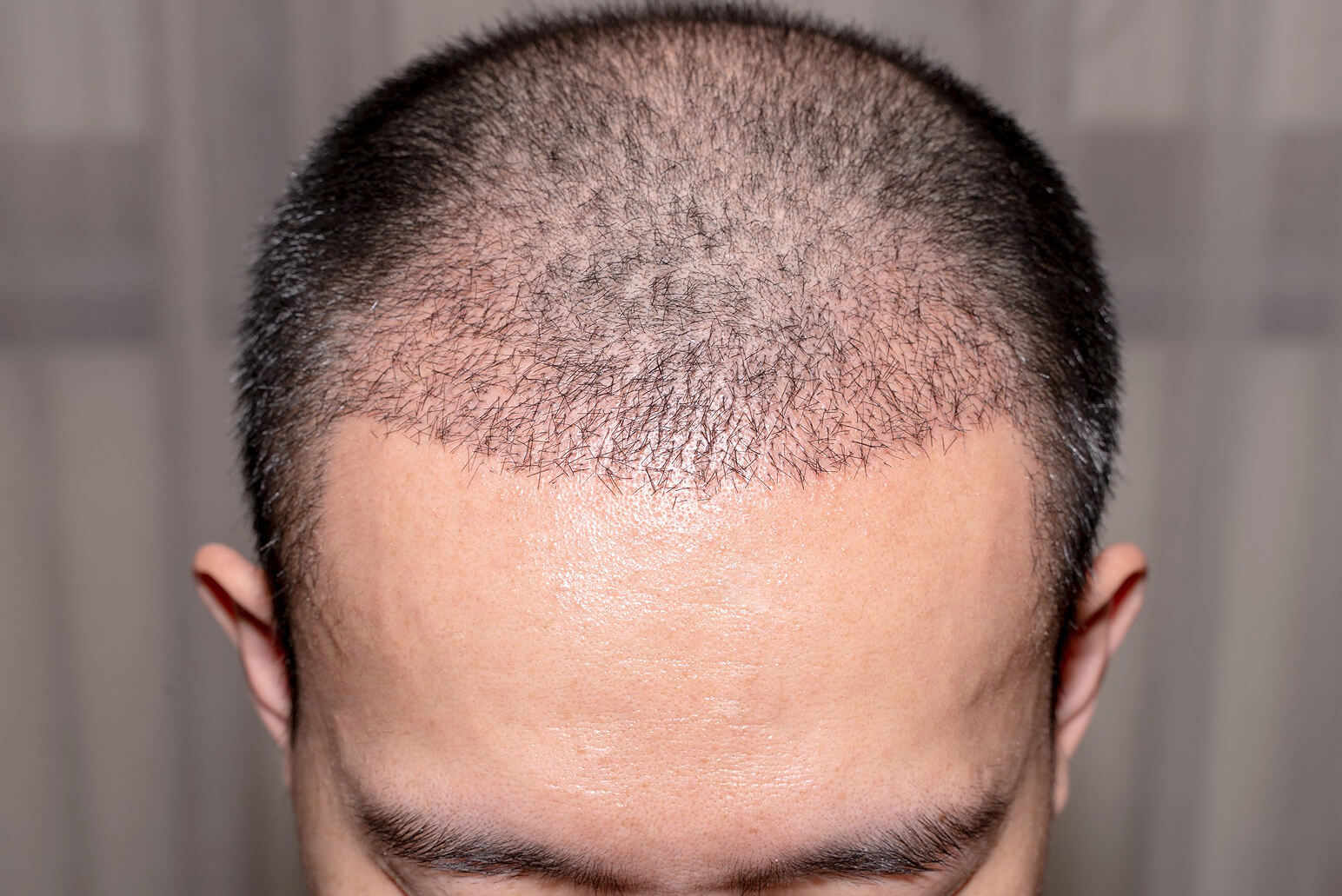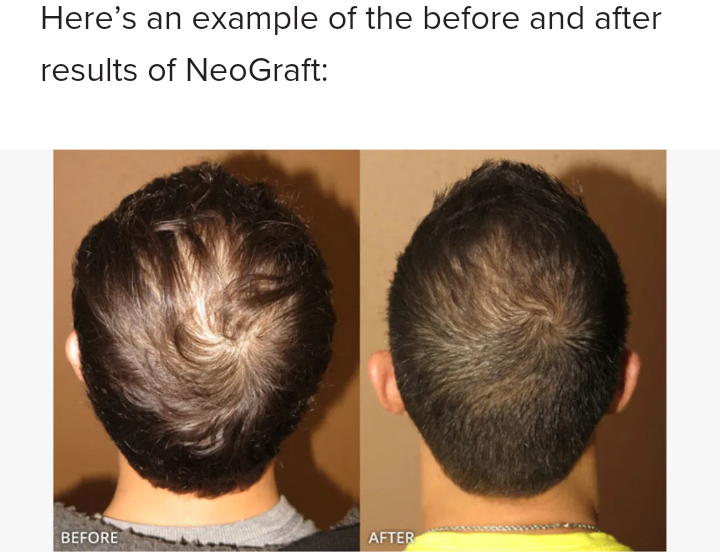
Blog
What is NeoGraft hair restoration

What is NeoGraft hair restoration
The majority of men and more than half of women experience hair loss as they age.
Several medical conditions can lead to hair loss, but the most common cause is androgenetic alopecia, more commonly known as male or female pattern hair loss.
Hair transplantations are surgeries that take hair follicles from one part of your scalp, usually from the back or sides, and implant them into balding areas.
The results of these surgeries have improved significantly since they were first performed in 1939Trusted Source.
The two most common techniques of hair transplantation are called follicular unit transplantation (FUT) and follicular unit excision (FUE). Both have the potential to deliver natural-looking and aesthetically pleasing results.
NeoGraft is a semi-automated version of FUE and one of the most modern hair implantations techniques. It’s touted to be more effective than other FUE techniques by removing some human error associated with the surgery.
NeoGraft benefits
NeoGraft is one of the newest and most advancedTrusted Source hair transplantation techniques. It’s a semi-automated version of the FUE technique that uses technology owned by Venus Treatments.
During FUE hair transplantation, a surgeon removes individual hair follicles manually either from the back or sides of your head.
They then make a series of incisions in the balding sections of your scalp before implanting the new hairs.
When using the NeoGraft technique, hair follicles are removed with a wand that extracts them with suction.
The surgeon doesn’t need to make an incision for new hair follicles and can instead use a special tool that makes the incisions and implants the follicles at the same time.
Reduced hair follicle damage
The NeoGraft system may reduce trauma and damage to hair follicles compared to traditional FUE and FUT surgeries.
SUBSCRIBE
What You Need to Know About NeoGraft Hair Transplants
Medically reviewed by Sara Perkins, MD — Written by Daniel Yetman on August 13, 2020
Benefits
Side effects and precautions
Picture
The procedure
Candidates
Vs. FUE and FUT
Cost
Recovery
Summary
What is NeoGraft hair restoration
The majority of men and more than half of women experience hair loss as they age.
Several medical conditions can lead to hair loss, but the most common cause is androgenetic alopecia, more commonly known as male or female pattern hair loss.
Hair transplantations are surgeries that take hair follicles from one part of your scalp, usually from the back or sides, and implant them into balding areas.
The results of these surgeries have improved significantly since they were first performed in 1939Trusted Source.
The two most common techniques of hair transplantation are called follicular unit transplantation (FUT) and follicular unit excision (FUE). Both have the potential to deliver natural-looking and aesthetically pleasing results.
NeoGraft is a semi-automated version of FUE and one of the most modern hair implantations techniques. It’s touted to be more effective than other FUE techniques by removing some human error associated with the surgery. Let’s look at the potential benefits and risks associated with NeoGraft hair transplants. We’ll also compare it to other hair loss restoration techniques and take a look at the cost.
NeoGraft benefits
NeoGraft is one of the newest and most advancedTrusted Source hair transplantation techniques. It’s a semi-automated version of the FUE technique that uses technology owned by Venus Treatments.
During FUE hair transplantation, a surgeon removes individual hair follicles manually either from the back or sides of your head.
They then make a series of incisions in the balding sections of your scalp before implanting the new hairs.
When using the NeoGraft technique, hair follicles are removed with a wand that extracts them with suction. The surgeon doesn’t need to make an incision for new hair follicles and can instead use a special tool that makes the incisions and implants the follicles at the same time.
Reduced hair follicle damage
The NeoGraft system may reduce trauma and damage to hair follicles compared to traditional FUE and FUT surgeries. It’s thought this reduction of trauma can improve the survival rateTrusted Source of transplanted hairs.
Fewer complications
Since this technique is minimally invasive, it may have a lower chance of surgical complication, especially compared to FUT surgery that involves cutting a strip of skin from your scalp.
NeoGraft doesn’t require any stitches or staples and the automation helps remove human error that could cause damage to nerves or blood vessels.
Quicker than FUE
NeoGraft surgery is also quicker than traditional FUE, which can take multiple days for a large number of grafts. According to Venus Treatments, a NeoGraft transplant usually takes between 4 and 10 hours.
NeoGraft potential side effects and precautions
A 2018 study lists the main drawbacks of NeoGraft as the steep learning curve for surgeons and the cost of the machine.
The surgery itself is generally considered safeTrusted Source and rarely causes serious complications. Some potential side effects include:
Moth-eaten appearance at donor site
If the donor site is overharvested, it can lead to a moth-eatenTrusted Source appearance where there’s noticeable hair loss.
Both NeoGraft and traditional FUE can lead to overharvesting if a surgeon removes too many follicles from one area.
Tiny scars
Unlike the FUT technique, FUE and NeoGraft don’t leave a long, thin scar.
However, they can cause pinpoint scarring where follicles are removed. Most of the time these scars aren’t noticeable, but they may be visible if you shave your head or wear your hair very short.
Unnatural hair line
If follicles aren’t implanted at an angle that matches your hairline, your results might not look natural. An unnatural hairline is a potential complication of any type of hair implantation surgery.
Shock hair loss
Some people experience shock loss, also known as postoperative effluvium, days or weeks after their surgery.
Shock loss is a temporary loss of implanted hair. Most of the time, the condition is temporary, and the hair grows back within 3 to 4 monthsTrusted Source.
Other complications
Other general complicationsTrusted Source of hair transplant surgeries include:
swelling
bleeding
inflamed hair follicles (folliculitis)
scalp numbness
ingrown hairs
infections
How NeoGraft transplantation works
Here’s what you can expect during a NeoGraft procedure:
Your surgeon will shave either your entire head or the section of scalp from which hair follicles will be donated.
They will then apply a local anesthetic to your scalp. They may offer you a mild sedative to help you relax during the procedure.
They will then extract your hair follicles with a special wand that uses pneumonic pressure.
The surgeon will then implant the hair follicles to the balding parts of your scalp using a specialized tool.
The surgeon may apply a dressing to the donor site and the implantation site to help manage bleeding.

Who needs a NeoGraft procedure?
Even though there isn’t any medical benefit to hair transplantation surgery, it may help you feel more confident about your appearance if you’re self-conscious about your hairline.
Hair transplantation surgeries generally work best for people with androgenic alopeciaTrusted Source, also known as male or female pattern hair loss.
Candidates for hair transplantation typically:
are free of conditions that may affect surgery, such as high blood pressure, unmanaged diabetes, and conditions that affect blood clotting
are older than 25 years old
have thick hair fibers
have hair loss along the hairline
have a hair color close to their skin color
have hair loss that isn’t caused by stress or medication
NeoGraft vs. FUT and FUE hair transplants
NeoGraft, FUT, and FUE follow similar procedures, and all three can provide you with aesthetically pleasing results.
During FUT surgery, a surgeon will cut a strip of hair from the back or side of your head before removing individual hair follicles.
This surgery is generally cheaper than FUE and NeoGraft, but it leaves a linear scar at the donation site. The scar may be noticeable if you wear your hair short.
FUE and the NeoGraft follow the same procedure, except NeoGraft is semi-automated.
During traditional FUE, a surgeon manually removes and hair follicles.
During NeoGraft surgery, hair follicles are harvested using suction instead of manual extraction and implanted using a specialized tool that controls the depth of insertion.